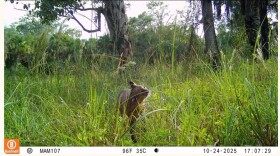Billions of taxpayer dollars are being spent to fix damage done to the Florida Everglades before it was understood what draining wetlands, altering the flow of the River of Grass, and destroying habitats would do to South Florida’s environment.
Yet Collier County commissioners this summer signed off on a new master-planned community totaling thousands of acres and targeted to be built within the wetlands of the western Everglades ecosystem.
The Town of Big Cypress includes three, city-sized villages — Rivergrass, Longwater, and Bellmar. In total, the development will result in 8,400 residences, up to 11,000 new residents, and nearly 1.6 million square feet of commercial space for hospitals and schools and movie theaters.

Huge environmental restoration projects to repair the Everglades are underway surrounding the proposed site, about four miles east of Naples.
The U.S. Fish and Wildlife Service, the agency that implements the Endangered Species Act, signed-off on the Big Cypress development while admitting more Florida panthers will die each year because of its existence.
That’s because the Bellmar Village portion is to be built within one mile of the Florida Panther National Wildlife Refuge, a 26,400-acre unfenced habitat for the endangered animal established more than 30 years ago.
The roads near Bellmar Village, such as Golden Gate Boulevard and Oil Well Road, are already deadly hotspots for panther-vehicle collisions.
Panther-vehicle mortality, a leading cause of documented panther deaths, will increase and this could lead to extinction of the Florida panther.Conservancy of Southwest Florida
At least 13 of the highly endangered panthers have been hit and killed by vehicles in South Florida this year. Environmentalists say residents of Bellmar will add 45,000 vehicle trips daily on roads near the panther refuge.
“The regulation has been completely eroded to the developers favor, and the panther is going to pay the price,” said Patty Whitehead of the Responsible Growth Management Coalition of Southwest Florida. “There is no mechanism now to protect panthers. There isn’t. It’s gone in Florida. It’s gone.”
Whitehead is one of several dozen opponents who joined some of the state’s top environmental nonprofits late last week to protest at the Naples Branch of the Collier County Library.
That’s where the Florida Department of Environmental Protection was having a final public presentation before deciding on whether to grant what amounts to penultimate permits involving permission to destroy natural wetlands for Bellmar Village.
The protestors gathered in an alcove outside the library before the FDEP’s event started. Some were carrying photos of panther carcasses crumpled on the side of a roadway after a vehicle strike. Other signs had the word “Bellmar” inside a red circle with a red line across it.
Elise Bennet, the Center for Biological Diversity’s Florida director and senior attorney, said Florida Panthers need every last inch of habitat remaining if they are to survive and recover.
“And we know this permit is only the tip of the spike leading the way to drive even more urban development into our panthers vital habitat, committing the species down the road to extinction," she said. "This is unacceptable.”
Opponents of the Town of Big Cypress, and Bellmar Village in particular, say it will doom the Florida panther population by bring more people into the animals’ domain, and create more traffic to hit and kill the panthers. The big cat population may only number about 200 today.
Inside a meeting room in the library, the state environmental protection agency had tables set up with posters filled with information about the Town of Big Cypress and the regulatory processes involved.
The protesters mingled with no less than eight FDEP representatives asking questions on how such a big community could get permission to destroy so many acreages of protected wetlands and swamps, and convince environmental regulators to build so close to the key habitat of a highly endangered species.
The FDEP was going to close the public comment period last week before making a decision, but with so much public interest remaining in the Big Cypress development, the agency said at the meeting, the deadline was extended to give everyone extra time to file their opinions online.
While Collier County and the federal fish and wildlife service has signed off on the initial development plans, several state and federal agencies, including the FDEP, have not.
Earthjustice, on behalf of the Center for Biological Diversity and Sierra Club, has filed a motion to block the issuance of the remaining permits for Bellmar Village, arguing it would result in significant loss of panther habitat and harm to the species.
Collier Enterprises, a Naples-based real estate investment and development firm has had a reputation earned by a long history of environmental stewardship. The company preserved large areas and open spaces and focused on sustainability in planning new communities and other projects.

Collier donated more than 260,000 acres of Southwest Florida wildlands contributing to the creation of several wildlife refuges and sanctuaries, often in tandem with Defenders of Wildlife, Florida Wildlife Federation, and the Florida Panther Protection Program.
The latter involves more than 195,000 acres in Collier County preserved to protect and manage the Florida panther and other endangered species in Southwest Florida.
Collier Enterprises was acquired by the Punta Gorda conglomerate, Tarpon Blue Family of Companies, in early October.
On the promotional website for the Town of Big Cypress, the Punta Gorda executives tout the thousands of job opportunities the development is going to create, as well as 880 affordable housing units — “an unprecedented commitment being made in cooperation with Collier County to ensure a variety of attainable housing for all.”
They say they will be making several environmental improvements that will be a lasting part of the development.
“The plan includes reestablishing historic waterways and restoring critical wildlife corridors. More than 12,000 acres of land are set to be preserved, maintained in perpetuity, and this preserved land will be three times the size of the development area.”
The developers say they are preserving 12,337 acres, including a key corridor for the Florida panther that connects with more conservation land to the north and with the Florida Panther National Wildlife Refuge to the south — all at no cost to Collier County taxpayers.
The Tarpon Blue group added: “Our planning team will continue to study wildlife and ecosystem issues, working with Florida and national panther experts, as well as experts in conservation biology, water quality, and other disciplines.”
Environmental reporting for WGCU is funded in part by VoLo Foundation, a non-profit with a mission to accelerate change and global impact by supporting science-based climate solutions, enhancing education, and improving health.
Sign up for WGCU's monthly environmental newsletter, the Green Flash, today.
WGCU is your trusted source for news and information in Southwest Florida. We are a nonprofit public service, and your support is more critical than ever. Keep public media strong and donate now. Thank you.





